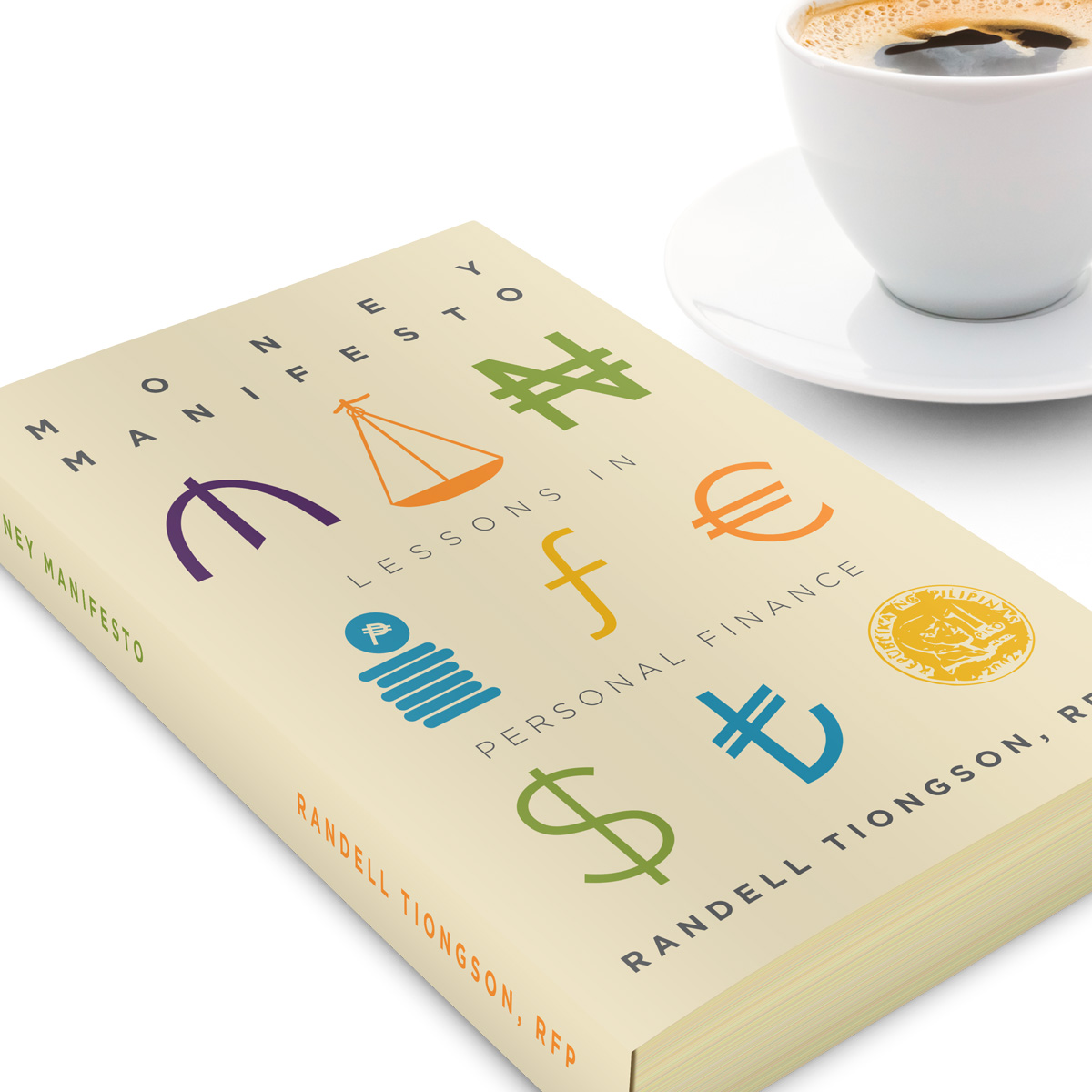My newest book, Money Manifesto
By Randell Tiongson on October 20th, 2014
Deputy BSP Governor Diwa Guinigundo, international celebrity Christian Bautista, rock star Mark Escueta, best-selling Author Dennis Sy, stock market advocate Marvin Germo, economist Dr. Alvin Ang and others have all agreed that Money Manifesto is a book worth reading.
What is this book all about? It’s a personal finance book that discusses a wide array of topics: Money management, Investing, Economics plus more… but, this book is more than just about the finance topics — it talks about my experiences and the experiences of others too. When my editor was working on my book, she said that this book seems to be more personal and has more heart.
Money Manifesto is a 300-page book that took me many years to write and like my other books, this one is intended to go beyond sharing information, this book is meant to encourage and to inspire the reader.
This book will be available in November 2014.

UITF, stock market, wealth formula and more!
By Randell Tiongson on August 12th, 2014
Here are 5 questions that I got regarding personal finance. I kept the answers short and practical.

1) Monica wants to know what are UITFs?
UITF stands for Unit Investment Trust Funds, it is a kind of investment that is being offered by the trust departments of big banks. UITFs are pooled funds, where investors put money in a fund and there is a fund manager that will invest for them according to the objectives of the fund. Depending on where it is invested, UITFs can be conservative, moderate or high-risk investments. UITFs are good investments for long-term objectives such as retirement or the college education of young children. Though they are not guaranteed investments, they have proved themselves to be a good way to grow your money in the long-run. Remember that UITFs are long term investments so if you plan to use your money in the short term, do not put them in UITFs.
2) Should I invest my money in business or in the stock market, Christine wonders.
Comparing a business and stocks is difficult, like comparing apples and oranges. While both are investments and both are risky ones at that, they operate and function differently. Owning a business means you are operating it yourself and you are on top of the company. You have a direct involvement on how the company operates. The benefit of having your business is that you own all the profits and the gains of the business. The downside is that should the business fail, you will bear all the losses and you may not have the competence and experience to make a business succeed. Stocks are fractional ownership of businesses, big ones at that. Buying stocks lets you have a part of a successfully big company or several companies and you stand to earn dividends or capital gain of your shares when you trade them in the stock market. Downside of stocks vs. business is your gain, an issue of scale. You stand to get a much better return for your money when your business succeeds as against stocks.
3) Patrick wants to know what the risks are in investing your money.
Well Patrick, the biggest risk involved in investing is capital loss. While some investments are guaranteed, the good ones where you can earn more are never guaranteed. Returns are always a function of the risk you take – the higher the risks are, the higher the potential returns. Some investments like stocks and mutual funds are fluctuating – they do not appreciate in a straight line and expect them to be fluctuating constantly. But if you invest over a long period, like over 5 years, the chances of loss of money is minimized as investments fluctuate up over the years. Low risk investments are not necessarily free of risk – the biggest risk for guaranteed or low investments is inflation. Low risk means low return and they are often below inflation rates.
4) John asks who should be in charge of the money, the husband or the wife?
Our Filipino custom dictates that the wife should be in charge of the finances. However, our customs are not always right. Finances are conjugal and how to manage money should likewise be conjugal. I don’t think only one spouse should
be given the sole responsibility on how to be in charge of the money – both should discuss and agree as to what to do with their finances. The operation of the family budget like payment of bills, balancing of the check book and the like can be delegated to the husband or the wife. Which spouse? Well, the one who is more financially disciplined should be the one – whether a husband or a wife.
5) Bianca is wondering if there is a formula to be able to build wealth.
Yes Bianca, there is a formula — a fundamental process that you can follow that will allow you to build your wealth. Let me first say that achieving wealth is a process and there are no short cuts to wealth. In my book No Nonsense Personal Finance, I outlined 5 steps for wealth. First step is to increase cash flow; you can achieve this by earning more money and spending less money. Step 2 is getting out of debt – as debt will prevent you from achieving your goals. Step 3 is building your emergency fund – 3 to 6 months worth of your expenses is a good measure. Step 4 is getting insurance for your protection. Finally, the 5th step is learning to invest for your future.
Got more questions? E-mail me at randellt@gmail.com
ANC’s On The Money
By Randell Tiongson on August 7th, 2012
 Finally, a well produced honest to goodness personal finance TV in the Philippines gets launched. ABS-CBN’s news channel, ANC recently launched its personal finance themed show called On The Money with hosts Edric Mendoza, Melissa Gecolea and Salve Duplito.
Finally, a well produced honest to goodness personal finance TV in the Philippines gets launched. ABS-CBN’s news channel, ANC recently launched its personal finance themed show called On The Money with hosts Edric Mendoza, Melissa Gecolea and Salve Duplito.
The Registered Financial Planner Institute Philippines has partnered with ANC’s On The Money to help provide content with the purpose of advocating financial education for Filipinos.
Here’s an excerpt of my guesting at On The Money’s episode on Money and Self-Worth which was aired August 6, 2012.
Catch On The Money daily at the ANC.
Watch it HERE




